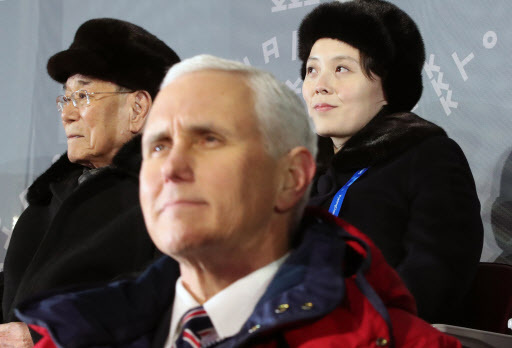The US is ready to engage in direct talks with North Korea even as it maintains its “maximum pressure campaign” on the regime, US Vice President Mike Pence has said, hinting at a shift in Washington’s North Korea policy.
The US and South Korea have agreed on terms for further engagement with North Korea, first by Seoul and then possibly leading to talks with Washington, Pence said in an interview with the Washington Post aboard Air Force Two on his way home from the Olympics in South Korea on Sunday.
“The point is, no pressure comes off until they are actually doing something that the alliance believes represents a meaningful step toward denuclearization,” the Post quoted Pence as saying. “So the maximum pressure campaign is going to continue and intensify. But if you want to talk, we’ll talk.”
 |
US Vice President Mike Pence (center) between Kim Yong-nam, North Korea's ceremonial head of state, and Kim Yo-jong, North Korean leader Kim Jong-un's sister. (Yonhap) |
Seoul declined to comment on the report, with a Cheong Wa Dae press official saying that related matters must be handled “prudently.”
Pence’s remarks come after North Korean leader Kim Jong-un’s sister Kim Yo-jong invited South Korean President Moon Jae-in to Pyongyang during their meeting at the Blue House on Saturday.
Moon neither accepted nor rejected the invitation, saying the Koreas should create an environment for such a summit to take place, apparently mindful of the US. He also encouraged the North to be more proactive in seeking dialogue with the US, according to Cheong Wa Dae.
The invitation left Moon with the pressing task of convincing North Korea to engage in dialogue over its nuclear and missile programs without alienating its biggest ally, the US.
Concerns surfaced over the possible discord between South Korea and the US in its approach to dealing with North Korea as Pence, who was in South Korea for the opening of the PyeongChang Olympics, increased US pressure on Pyongyang by highlighting the brutality of the regime during his time here.
Pence was seen ignoring or avoiding high-profile North Korean delegates, including Kim Yo-jung, when he was in close proximity to them during the reception hosted by President Moon and during the opening ceremony of the Winter Games.
But Pence’s comments aboard Air Force Two may signal Trump administration’s policy shift to engagement with Pyongyang and an easing of conditions for talks with it. Previously, the US had ruled out any possibility of talks with the North unless it agreed to discuss giving up its nuclear weapons.
During Pence’s visit, Moon assured Pence he would tell the North Koreans clearly that they would not get economic or diplomatic concessions for just talking, only for taking concrete steps toward denuclearization, according to the Post. Based on this assurance, Pence was cited as saying, he felt confident he could endorse post-Olympic engagement with Pyongyang.
But Pence said that the pressure campaign would continue at the same time. Washington has sought to isolate Pyongyang through sanctions and diplomacy to convince it to sit down for talks on its denuclearization.
Earlier in Japan, Pence said that Washington will soon unveil its “toughest and most aggressive sanctions” ever against North Korea after talks with Japanese Prime Minister Shinzo Abe in Tokyo on Wednesday.
China and Japan showed mixed reactions to Pyongyang’s overture.
China, North Korea’s largest trading partner, welcomed North Korea’s move.
“The two Koreans strive to break the nuclear deadlock through the Olympics,” China’s state-run Xinhua news agency reported, adding the opening of dialogue on the Korean Peninsula was up to the two Koreas’ will and neighboring countries’ support.
A high-ranking Chinese official met with Kim Yong-nam, North Korea’s ceremonial head of state, when they were in South Korea to attend the opening ceremony of the Olympics on Friday, according to China’s Foreign Ministry.
They had “exchanges,” Chinese Foreign Ministry spokesman Geng Shuang said in a press briefing without elaborating what they discussed during the meeting.
In Washington, China’s top diplomat Yang Jiechi said that China hopes the thaw in inter-Korean ties over the Olympics can be translated over into regular talks between North Korea and the US during his meeting with the US President Donald Trump on Friday, according to China’s Foreign Ministry.
Japan, on the other hand, expressed skepticism over the communist regime’s peace overture, warning against its “smile diplomacy.”
“Japan and South Korea joined the path for dialogue with North Korea, but it continued to develop its nuclear and missile programs. Talks for the sake of talks are meaningless,” Japanese Defense Minister Itsunori Onodera told reporters on Saturday.
Japanese Prime Minister’s Shinzo Abe told Moon during their meeting at Cheong Wa Dae that he favors the swift resumption of joint US-South Korean military exercises, which had been delayed until after the Olympics to ensure calm and security during the Olympics.
In response, Moon said that it was an internal affair and that it was inappropriate for Abe to bring it up, according to Cheong Wa Dae.
Tokyo has accused the North of using the Olympics to loosen the international sanctions regime, “buying time” to perfect its nuclear and missile technology and water down the Korea-US alliance.
(
laeticia.ock@heraldcorp.com)







![[Today’s K-pop] Blackpink’s Jennie, Lisa invited to Coachella as solo acts](http://res.heraldm.com/phpwas/restmb_idxmake.php?idx=644&simg=/content/image/2024/11/21/20241121050099_0.jpg)
